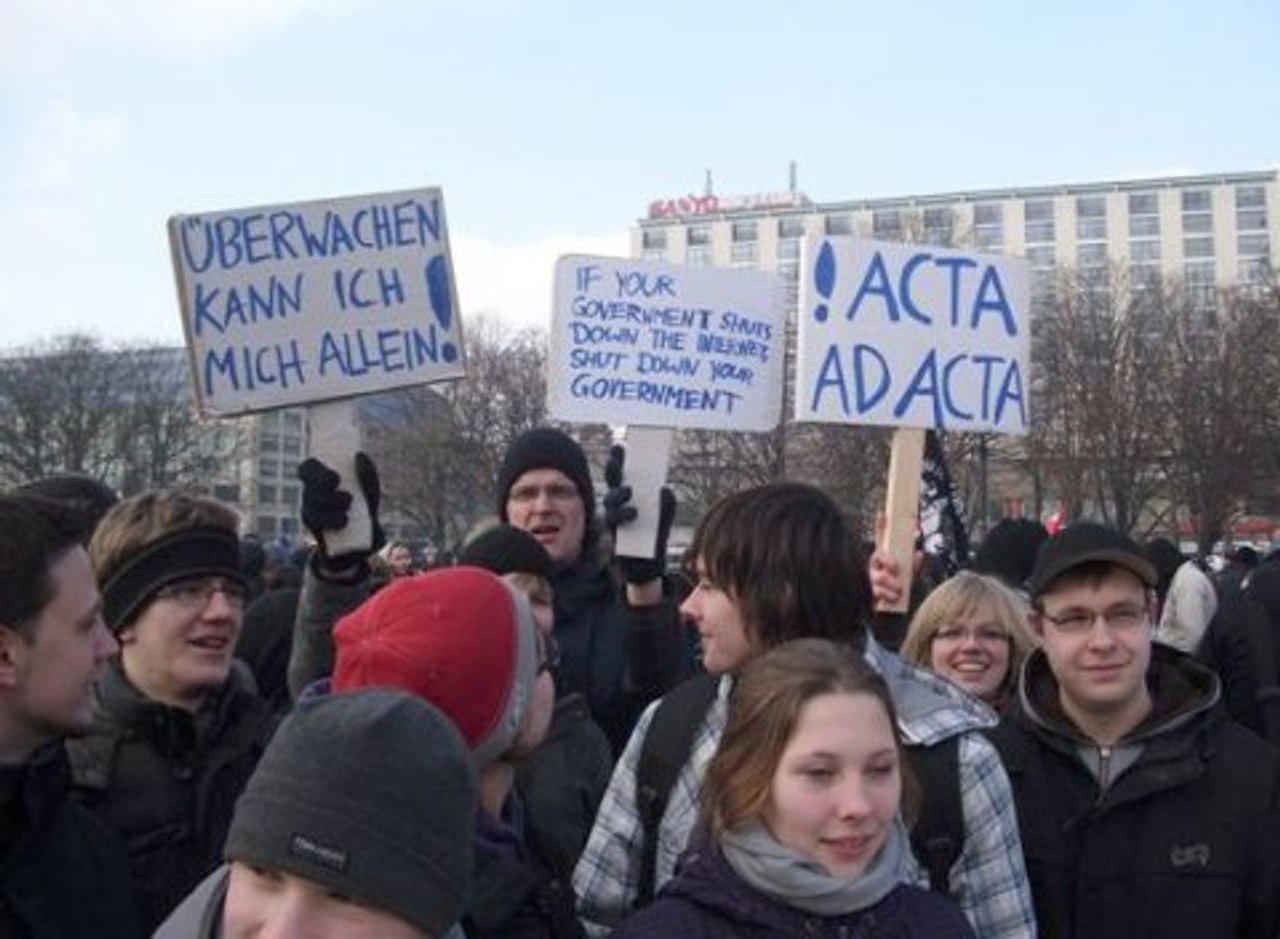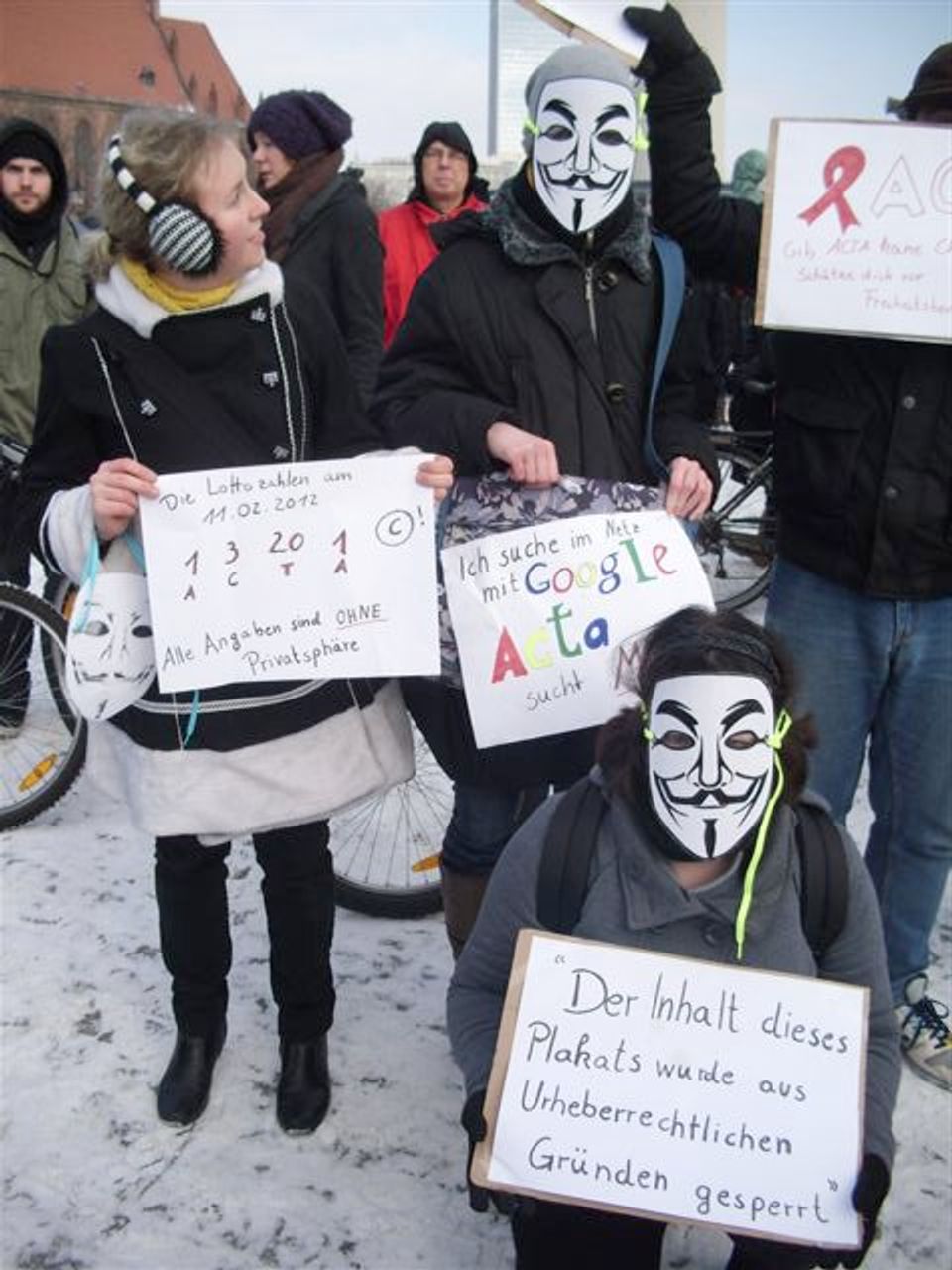 Last Saturday, tens of thousands took to the streets in about 60 German cities to protest against the multi-national Anti-Counterfeiting Trade Agreement (ACTA), which threatens freedom of expression on the Internet, among other abuses. The largest protests were held in Munich and Berlin, where over 10,000 demonstrated in each city. There were additional protests of more than 1,000 people in Frankfurt, Nuremberg, Augsburg, Leipzig and Hanover. Demonstrations and protests were held worldwide in 150 countries.
Last Saturday, tens of thousands took to the streets in about 60 German cities to protest against the multi-national Anti-Counterfeiting Trade Agreement (ACTA), which threatens freedom of expression on the Internet, among other abuses. The largest protests were held in Munich and Berlin, where over 10,000 demonstrated in each city. There were additional protests of more than 1,000 people in Frankfurt, Nuremberg, Augsburg, Leipzig and Hanover. Demonstrations and protests were held worldwide in 150 countries.
The protests are an expression of growing resistance, especially among young people, to the increasing surveillance of the Internet and the dismantling of democratic rights in general. The political platform Avaaz has collected more than 2.2 million online signatures against ACTA since January 25.
ACTA is an international trade agreement that was negotiated between the EU, the U.S. and nine other countries in secret. Initial discussions on the agreement took place in 2006 during the European Union summit in St. Petersburg, Russia. The final version was submitted in May 2011. The contents of the agreement only emerged after parts of the draft had been “leaked”.
The official goal of the signatory states is to create a mechanism to proceed against so-called piracy. The ACTA text calls for the “enforcement of intellectual property rights in the digital environment”. A statement by those involved in drawing up the agreement declares that its aim is to “Combat in particular rampant counterfeiting and piracy, which undermine legitimate trade and a sustainable development of the global economy”.
Opponents of ACTA charge, however, that Internet providers will be forced by the agreement to monitor their users. ACTA, for example, requires that providers disclose the IP addresses of users to identify the persons as offenders. This would make it easier for the authorities to criminalize Internet users for minor offenses and enforce copyright claims.
According to critics, if the pact is enforced, companies could determine individual liberties on the Internet and the profit interests of the entertainment industry would be placed above such basic democratic rights such as data protection, the protection of privacy and freedom of expression.
 Representatives of the collective Anonymous, one of the groups behind the anti-ACTA protests, also criticize the fact that the agreement would open up opportunities for governments to implement Internet censorship. They compare ACTA with the Stop Online Piracy Act (SOPA) and the Protect IP Act (PIPA), which were debated in the US Congress in January. SOPA and PIPA are also ostensibly aimed primarily against the infringement of intellectual property rights, but allow US authorities to issue court orders to block entire Internet domains.
Representatives of the collective Anonymous, one of the groups behind the anti-ACTA protests, also criticize the fact that the agreement would open up opportunities for governments to implement Internet censorship. They compare ACTA with the Stop Online Piracy Act (SOPA) and the Protect IP Act (PIPA), which were debated in the US Congress in January. SOPA and PIPA are also ostensibly aimed primarily against the infringement of intellectual property rights, but allow US authorities to issue court orders to block entire Internet domains.
The German Justice Ministry has rejected any criticism of ACTA, claiming that the agreement does not alter the current legal situation in Germany. Federal Justice Minister Sabine Leutheusser-Schnarrenberger (Free Democratic Party--FDP) declared that ACTA does not contain the option “for example, of blocking the Internet or blocking access to the Internet”.
Last Friday the Foreign Office then suddenly announced it planned to put the agreement on ice. A spokesman explained that Leutheusser-Schnarrenberger had expressed her own concerns, but had not come to a decision. The justice minister continues to insist that the agreement does not involve a tightening of restrictions on Internet service providers and did not contravene existing German and European data protection regulations.
The German government—a coalition of the conservative Christian Democratic Union (CDU), Christian Social Union (CSU) and the free market FDP—was clearly surprised and alarmed by the opposition to the controversial agreement. The initial decision to distance itself verbally from the agreement, however, does not represent any fundamental shift in attitude by the coalition government towards ACTA. According to the Süddeutsche Zeitung, the government had actually planned to sign the agreement along with 22 other EU countries on January 26, but declined to do so due to so-called administrative problems.
The Federation of German Industry (BDI) immediately criticized the Federal Government’s decision. “With its about-turn in regard to the anti-piracy agreement ACTA, the government has harmed innovation in Germany and sends a disastrous signal to Brussels”, declared BDI Chief Executive Mark Kerber on Saturday in Berlin. According to Kerber, the main objective of the agreement is to “combat piracy in the fields of commerce and the media, not to proceed against illegal music downloads”. Along with the government, Kerber maintains that ACTA does not affect existing data protection rules and would not result in censoring the Internet.
It appears that a dispute has developed among the governing coalition parties as to how to proceed with ACTA. On Monday the FDP parliamentary fraction announced that freedom of information on the Internet should not be hindered by a hasty passage of the ACTA legislation. Government Spokesman Steffen Seibert declared that Chancellor Angela Merkel (CDU) remained loyal to ACTA. The agreement was “necessary and proper”, Seibert said and did not involve “any of the dangers that are being invoked”.
Representatives of the CDU and CSU criticized the decision to delay signing ACTA into law, and apparently in response to comments from the FDP’s coalition partners, Justice Ministry Spokesman Anders Mertzlufft raised the possibility that the European Parliament could present ACTA to the European Court of Justice for review. However, this would involve a delay of from one to two years.
The Social Democratic Party (SPD), the Greens, the Left Party and the Pirate Party have welcomed the provisional suspension of ACTA by the government. However, none of these parties is willing or able to undertake a genuine campaign against the agreement. Legal Affairs Spokesman Burkhard Lischka (SPD) declared that now “the EU Parliament is required to set up a dialogue, which effectively amounts to reconciling the interests of authors, users and recyclers”.
The perspective of the Pirate Party is to make appeals to the established parties, which already have a long record of undermining democratic rights. Pirate spokesman for Lower Saxony, Michael Leukert, called upon “German deputies and the European Parliament to take the concerns of citizens seriously and refuse to ratify the agreement as has already happened in Poland, Czech Republic, Latvia and Slovakia”.
In a press release, the Pirate Party declares that “it is explicitly opposed to the planned content of the agreement, which disproportionately prioritizes the interests of business above democratic rights”.
Describing agreements like ACTA, SOPA or PIPA as simply “disproportionate” fails to identify the core of the problem and downplays the dangers inherent in ACTA and other such pacts.
The attacks on the freedom of the Internet are part of a general attack on democratic rights and must be seen in a broader political context. The very fact that repressive regimes such as Jordan, Morocco, the United Arab Emirates and Singapore are among the countries participating in ACTA, which was coordinated and negotiated internationally in secret, makes clear that it is not only concerned with copyright protection.
The global ruling elite is responding to growing popular protests by assaulting democratic rights at all levels. The Internet is particularly in focus. The past year has demonstrated the influence of social networks such as Facebook and Twitter in coordinating protests. At the end of January 2011 the imperialist-backed regime of Hosni Mubarak shut down the entire Internet in an attempt to stop the Egyptian revolution.
